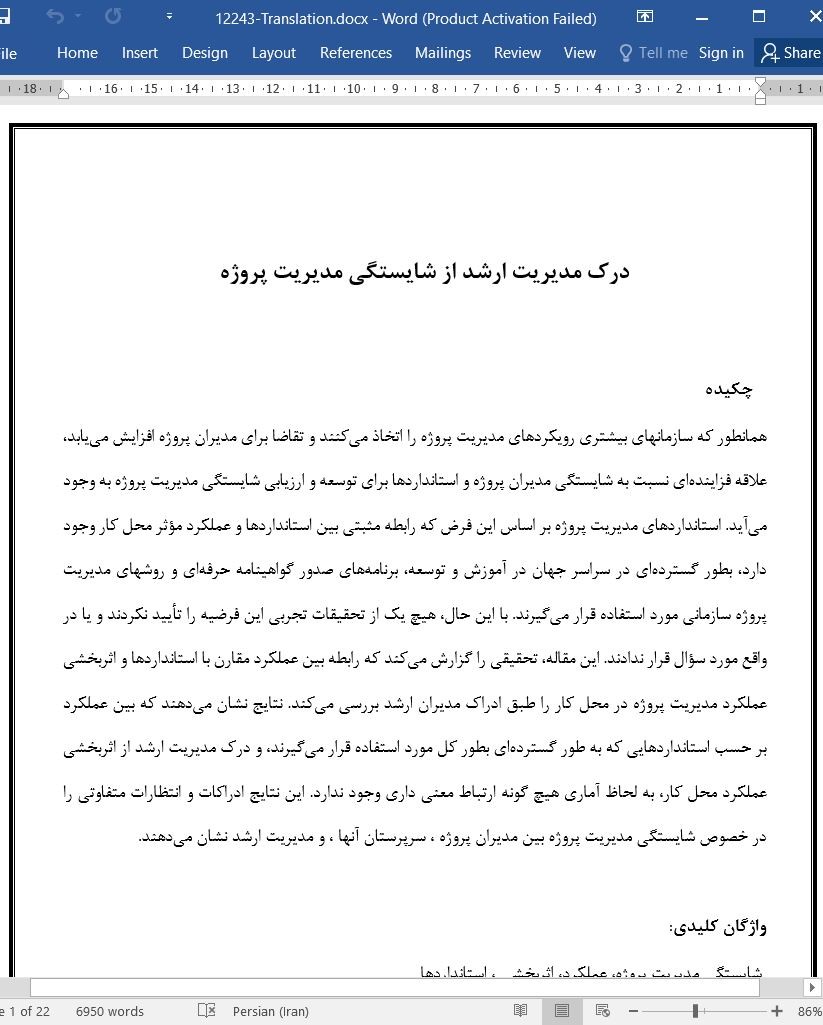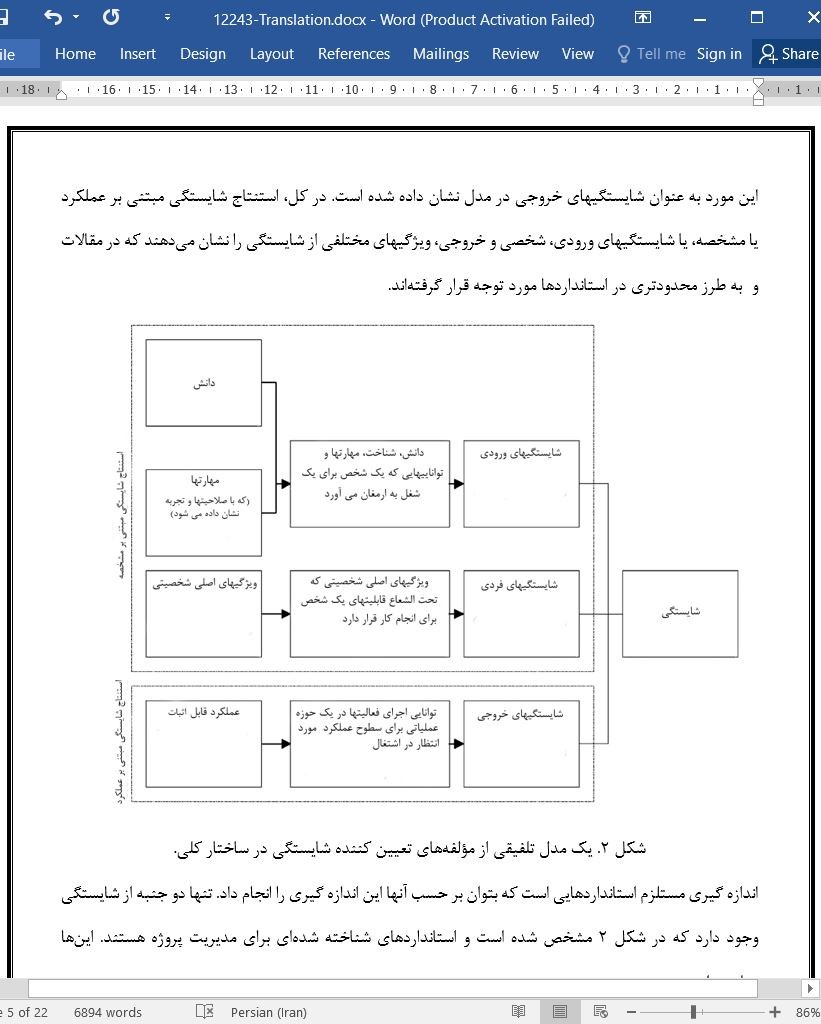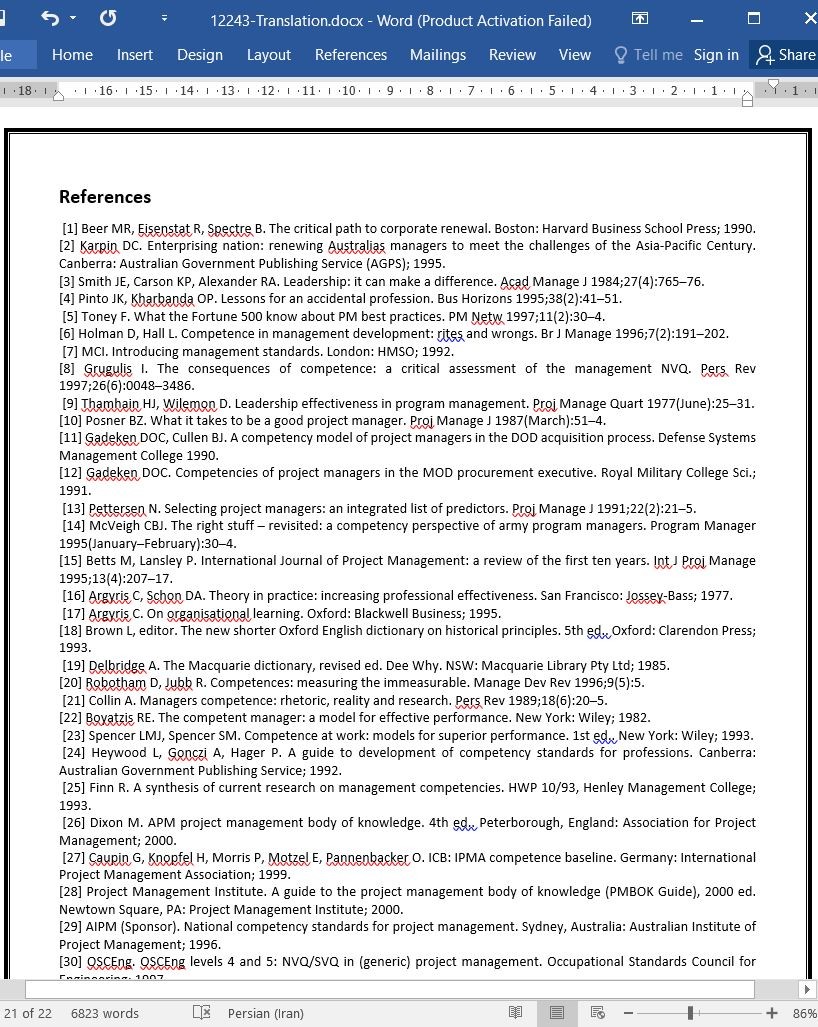
درک مدیریت ارشد از شایستگی مدیریت پروژه
چکیده
همانطور که سازمانهای بیشتری رویکردهای مدیریت پروژه را اتخاذ میکنند و تقاضا برای مدیران پروژه افزایش مییابد، علاقه فزایندهای نسبت به شایستگی مدیران پروژه و استانداردها برای توسعه و ارزیابی شایستگی مدیریت پروژه به وجود میآید. استانداردهای مدیریت پروژه بر اساس این فرض که رابطه مثبتی بین استانداردها و عملکرد مؤثر محل کار وجود دارد، بطور گستردهای در سراسر جهان در آموزش و توسعه، برنامههای صدور گواهینامه حرفهای و روشهای مدیریت پروژه سازمانی مورد استفاده قرار میگیرند. با این حال، هیچ یک از تحقیقات تجربی این فرضیه را تأیید نکردند و یا در واقع مورد سؤال قرار ندادند. این مقاله، تحقیقی را گزارش میکند که رابطه بین عملکرد مقارن با استانداردها و اثربخشی عملکرد مدیریت پروژه در محل کار را طبق ادراک مدیران ارشد بررسی میکند. نتایج نشان میدهند که بین عملکرد بر حسب استانداردهایی که به طور گستردهای بطور کل مورد استفاده قرار میگیرند، و درک مدیریت ارشد از اثربخشی عملکرد محل کار، به لحاظ آماری هیچ گونه ارتباط معنی داری وجود ندارد. این نتایج ادراکات و انتظارات متفاوتی را در خصوص شایستگی مدیریت پروژه بین مدیران پروژه ، سرپرستان آنها ، و مدیریت ارشد نشان میدهند.
1. مقدمه
مدیریت پروژه به عنوان یک حوزه عملی پدیدار شده، و به طور فزایندهای توسط سازمانها برای رسیدن به اهداف تجاریشان مورد استفاده قرار میگیرد. همانطور که سازمانها بیشتر فعالیتهای خود را به عنوان پروژه تعریف میکنند، تقاضا برای مدیران پروژه نیز افزایش مییابد و علاقه فزایندهای نسبت به شایستگی مدیریت پروژه بوجود میآید. شایستگی پرسنل مدیریت پروژه مهم است، زیرا آنها تأثیر بزرگی بر عملکرد پروژه و بنابراین عملکرد تجاری آن دارند (1-4)(شکل 1). بطوریکه یکی از مدیران ارشد میگوید: " کلید موفقیت پروژه، انتخاب مدیران پروژه مناسب است" (5).
5. نتیجه گیری
استانداردهای مدیریت پروژه بر اساس این فرضیه که رابطه مثبتی بین استانداردها و عملکرد مؤثر در محل کار وجود دارد، بطور گستردهای در آموزش و توسعه، برنامههای صدور گواهینامه حرفهای و روشهای مدیریت پروژههای سازمانی مورد استفاده قرار میگیرند. با این حال، هیچ تحقیق تجربی این فرضیه را که بطور طبیعی در توسعه استانداردها توسط متخصصان پروژه اعمال میشود، تأیید نکرد و مورد سؤال قرار نداد. این تحقیق به منظور بررسی رابطه بین عملکرد مقارن با استانداردها و درک اثربخشی عملکرد پروژه در محل کار توسط مدیران پروژه انجام شد.
Abstract
As more organisations adopt project management approaches and the demand for project managers grows, there is increasing interest in the competence of project managers and in standards for development and assessment of project management competence. Project management standards are being used extensively throughout the world in training and development, professional certification programmes and corporate project management methodologies on the assumption that there is a positive relationship between standards and effective workplace performance. However, there has been no empirical research reported that supports or indeed questions this assumption. This paper reports on research that explores the relationship between performance against standards and the effectiveness of project management performance in the workplace, as perceived by senior managers. Results suggest that there is no statistically significant relationship between performance against the widely used standards in their entirety, and senior management perceptions of effectiveness of workplace performance. Results suggest different perceptions and expectations of project management competence between project managers and their supervisors, senior management.
1. Introduction
Project management has emerged as a field of practice that is being used increasingly by organisations to achieve their business goals. As organisations define more of their activities as projects, the demand for project managers grows, and there is increasing interest in project management competence. Competence of project management personnel is important as they are seen as having a major impact on project performance and therefore on business performance [1–4] (Fig. 1). As one senior manager says: ‘‘The key to project success is to pick the right project manager’’ [5].
5. Conclusions
Project management standards are being used extensively throughout the world in training and development, professional certification programmes and corporate project management methodologies, based on the assumption that there is a positive relationship between standards and effective workplace performance. However, there has been no empirical research reported that supports or indeed questions this assumption which is inherent in the way the standards have been developed by expert practitioners. Research was undertaken to explore the relationship between performance against standards and effectiveness of project management performance in the workplace as perceived by senior managers.
چکیده
1. مقدمه
2. پیش زمینه
2.1 دلیل تحقیق
2.2. یک مدل تلفیقی از شایستگی مدیریت پروژه
3. متدولوژی
3.1. عملکرد مقارن با استانداردها
3.2. ادراک سرپرست از اثربخشی محل کار
3.3. ماهیت و زمینه پروژهها
3.4. جمع آوری و تحلیل دادهها
4. نتایج تحقیق
4.1. تحلیل تاییدی : دانش و استفاده از شیوهها
4.2.تحلیل اکتشافی
5. نتیجه گیری
منابع
Abstract
1. Introduction
2. Background
2.1. Rationale for research
2.2. An integrated model of project management competence
3. Methodology
3.1. Performance against standards
3.2. Supervisor perceptions of workplace effectiveness
3.3. Nature and context of projects
3.4. Data collection and analysis
4. Research results
4.1. Confirmatory analysis: knowledge and use of practices
4.2. Exploratory analysis
5. Conclusions
References
- اصل مقاله انگلیسی با فرمت ورد (word) با قابلیت ویرایش
- ترجمه فارسی مقاله با فرمت ورد (word) با قابلیت ویرایش، بدون آرم سایت ای ترجمه
- ترجمه فارسی مقاله با فرمت pdf، بدون آرم سایت ای ترجمه



